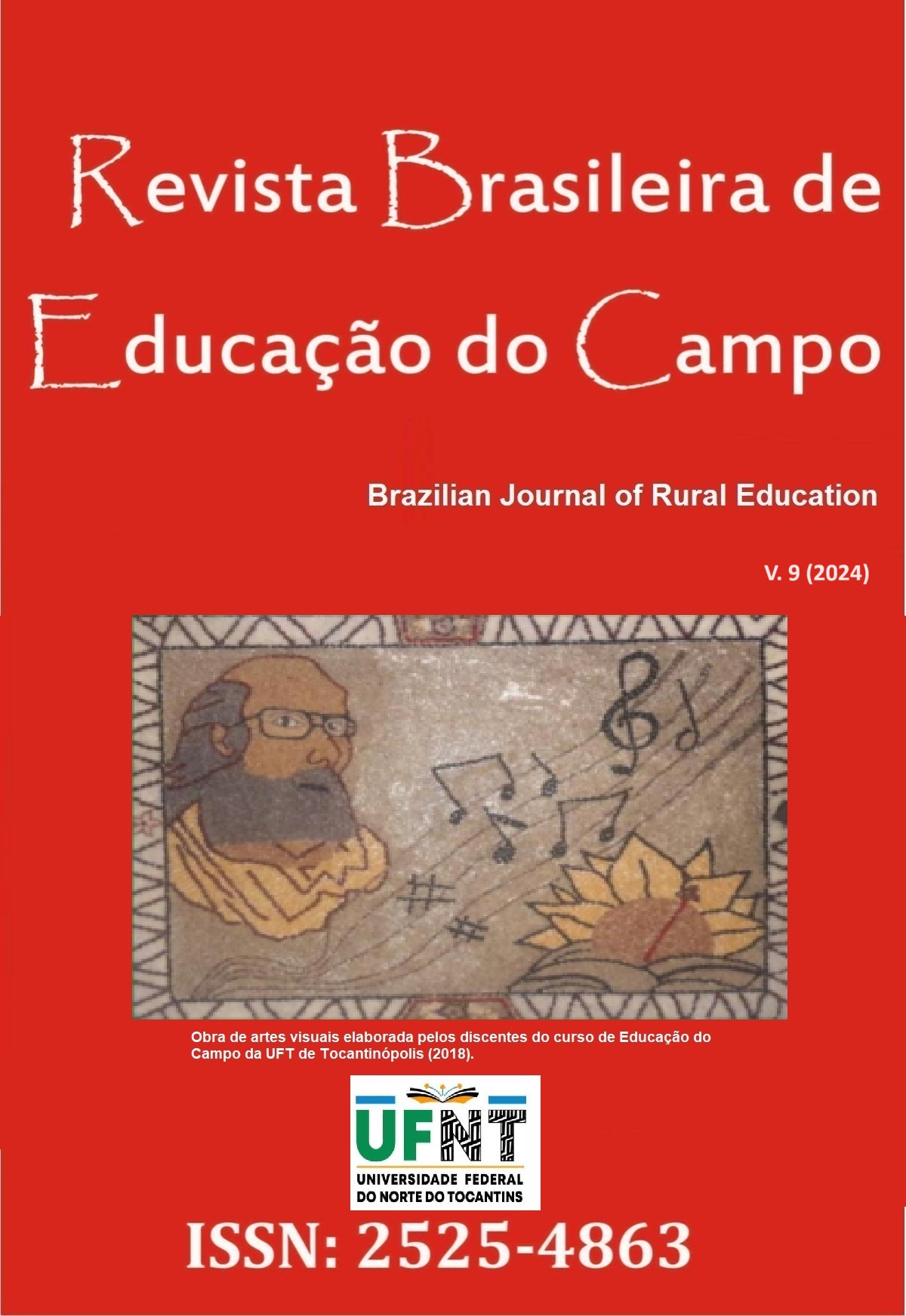Early childhood education in rural areas: human emancipation or reproduction of social inequalities
DOI :
https://doi.org/10.70860/ufnt.rbec.e19324Résumé
ABSTRACT. The early childhood education, a stage within the school education system, presents many aspects to be problematized and implemented, especially when considering the implementation of this stage in the rural context. Among these aspects, the socio-cultural and historical context in which the child develops as a person and social being stands out, consisting of unique experiences, distinct from other spaces, demanding from the formal education planning a commitment to the local way of being. With this contextual characterization, the objective of this study is to analyze whether the educational principle of early childhood education in rural areas contributes/leads towards a socio-cultural emancipation education or towards confirming the inequalities between rural and urban areas. Drawing from a bibliographical study, this production has as its theoretical framework the contributions of Bauman (2008), Dubet (2001, 2004), Kramer (1982), Reay (2013), Sawaia (1999), Vincent, Lahire, and Thin (2001), among others, as well as legal documents relevant to Early Childhood Education in rural areas, texts analyzed according to the guidelines of critical discourse analysis technique. As results, we present the proposal of an early childhood education in rural areas with an emancipatory educational principle, supported by practices and discourses of inclusion, holistic human formation, and combating social inequalities.
Téléchargements
Références
Abreu, A. C. S. S. R. de. (2020). Prática docente na educação infantil em agrupamentos de multiidade no município de Altos/PI: experiências/resistências no campo (Dissertação de Mestrado). Universidade Federal do Piauí, Piauí.
Bauman, Z. (2008). Vida para o consumo: a transformação das pessoas em mercadoria. Rio de Janeiro: Zahar.
Base Nacional Comum Curricular. Brasília: MEC, 2017. Recuperado de: http://basenacionalcomum.mec.gov.br/images/BNCC_EI_EF_110518_versaofinal_site.pdf.
Diretrizes Curriculares Nacionais para a Educação Infantil. (2010). Brasília: MEC, SEB.
Bourdieu, P., & Champagne, P. (1997). Os excluídos do interior. In Bourdieu, P. (Coord.). A miséria do mundo (pp. 481-691). 4. ed. Petrópolis, RJ: Vozes.
Correia, F. C., & Silva, J. A. A. (2023). O que é uma escola justa? Revista Imagens da Educação, 13(1), 153-167. DOI: https://doi.org/10.4025/imagenseduc.v13i1.62521
Dubet, F. (2001). As desigualdades multiplicadas. Revista Brasileira de Educação, (17), 05-19. DOI: https://doi.org/10.1590/S1413-24782001000200002
Dubet, F. (2004). O que é uma escola justa? Cadernos de Pesquisa, 34(123), 539-555. DOI: https://doi.org/10.1590/S0100-15742004000300002
Fairclough, N. (2008). Discurso e mudança social. Brasília: Editora Universidade de Brasília.
Giroux, H. A. (1997). Os professores como intelectuais transformadores. In Giroux, H. A. (Org.). Os professores como intelectuais: rumo a uma pedagogia da aprendizagem (pp. 157-164). Porto Alegre: Artes Médicas.
Han, B-C. (2018). Psicopolítica: o neoliberalismo e as novas técnicas de poder. Belo Horizonte: Âyiné.
Kramer, S. (1982). Privação cultural e educação compensatória: uma crise analítica. Cad. Pesq., (42), 4-62.
Lei n. 9.394/96, de 20 de dezembro de 1996. (2017). Estabelece as Diretrizes e Base da Educação Nacional. Recuperado de: https://www2.senado.leg.br/bdsf/bitstream/handle/id/529732/lei_de_diretrizes_e_bases_1ed.pdf.
Masschelein, J., & Simons, M. (2017). Em defesa da escola: uma questão pública. Belo Horizonte: Autêntica.
Oliveira, M. R. D. de, & Oliveira, N. do S. da S. (org.). (2017). Práticas e docência em classes multisseriadas. In Souza, E. C. de, & Antunes, H. S. (Orgs.). Formação e trabalho docente em contexto rural: diálogos teórico-metodológicos (pp. 61-86). Campinas, SP. Mercado das Letras.
Prodanov, C. C., & Freitas, E. C. de. (2013). Metodologia do trabalho científico: métodos e técnicas de pesquisa e do trabalho acadêmico. Novo Hamburgo: Feevale.
Reay, D. (2013). Sociologia, classe social e educação. In Apple, M. W., Ball, S. J., & Gandin, L. A. (Orgs.). Sociologia da educação: análise internacional (pp. 428 – 437). Porto Alegre: Penso.
Sandín Esteban, M. P. (2010). Pesquisa qualitativa em educação: fundamentos e tradições. Porto Alegre: AMGH.
Santos, B. de S., & Meneses, M. P. (2009). Introdução. In Santos, B. de S., & Meneses, M. P. (Orgs.). Epistemologias do Sul (pp. 9-19). Coimbra, PT: Almedina.
Sawaia, B. (2014). Introdução: exclusão ou inclusão perversa? In Sawaia, B. (Org.). As artimanhas da exclusão: análise psicossocial e ética da desigualdade social (pp. 07-13). Petrópolis, RJ: Vozes.
Silva, A. P. S., & Pasuch, J. (2010). Orientações Curriculares para a educação Infantil do Campo.
Souza, E. C. de, & Antunes, H. S. (Orgs.). (2017). Diálogos iniciais: interface entre o trabalho docente e educação rural. In Souza, E. C. de, & Antunes, H. S. (Orgs.). Formação e trabalho docente em contexto rural: diálogos teórico-metodológicos (pp. 19-30). Campinas, SP: Mercado das Letras.
Vincent, G., & Lahire, B. & Thin, D. (2007). Sobre a história e a teoria da forma escolar. Educação em revista, (33), 07-47.
Wanderley, M. B. (2014). Refletindo sobre a noção de exclusão. In Sawaia, B. (org.). As artimanhas da exclusão: análise psicossocial e ética da desigualdade social (pp. 16-26). Petrópolis, RJ: Vozes.
Téléchargements
Publié-e
Comment citer
Numéro
Rubrique
Licence
© Airan Celina Sepúlveda dos Santos Rocha de Abreu, Carmen Lúcia de Oliveira Cabral 2024

Cette œuvre est sous licence Creative Commons Attribution 4.0 International.
Proposal for Copyright Notice Creative Commons
1. Policy Proposal to Open Access Journals
Authors who publish with this journal agree to the following terms:
A. Authors retain copyright and grant the journal right of first publication with the work simultaneously licensed under the Creative Commons Attribution License that allows sharing the work with recognition of its initial publication in this journal.
B. Authors are able to take on additional contracts separately, non-exclusive distribution of the version of the paper published in this journal (ex .: publish in institutional repository or as a book), with an acknowledgment of its initial publication in this journal.
C. Authors are permitted and encouraged to post their work online (eg .: in institutional repositories or on their website) at any point before or during the editorial process, as it can lead to productive exchanges, as well as increase the impact and the citation of published work (See the Effect of Open Access).














